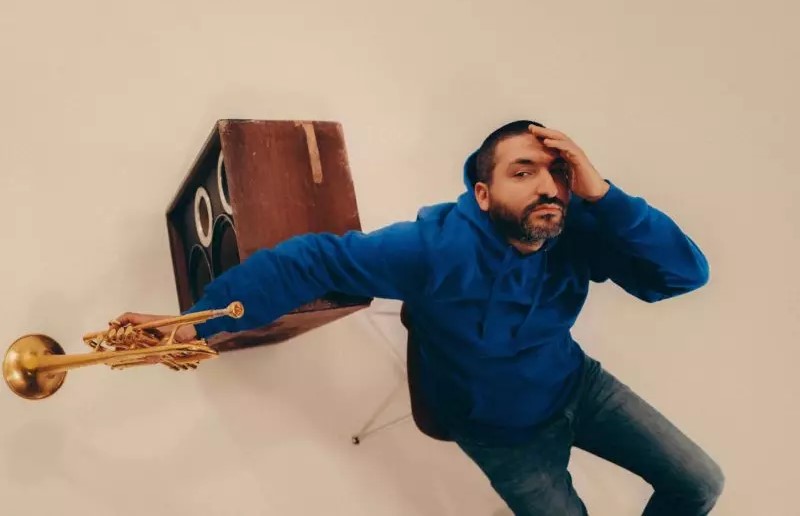His albums are the generic music of life: Who is Ibrahim Maalouf?
The artist brought a new interpretation to jazz by combining the maqams of the East with jazz music, thanks to the microtonal trumpet invented by his father Nassim Maaoluf.

Lebanese-born trumpet virtuoso and composer Ibrahim Maalouf has been breaking the boundaries of musical genres for many years in his works created with sounds that unite geographies. In addition to being someone who loves joint productions, his discography is also full of various soundtrack albums.
About Ibrahim Maalouf
*Ibrahim Maalouf was born in a bombed hospital in Beirut in 1980, five years after the start of the Lebanese Civil War. At that time, his father, who was farming in the mountains and dreamed of becoming a trumpet player, was only 24 years old. The family moved to a suburb of Paris to stay until the situation in their country calmed down and never returned.
Ibrahim Maalouf (born 5 November 1980 in Beirut) is a French-Lebanese trumpeter, producer, arranger, and composer. In 2022, he became the first Lebanese instrumentalist nominated at the Grammy Awards for his album Queen of Sheba in collaboration with Angélique Kidjo.
* Maalouf comes from a family full of artists. His father, Nassim Maalouf, is a trumpet master. His mother, Nada Maalouf, is a pianist. Writer Amin Maalouf is the musician's uncle.
* Hearing jazz was a real turning point for Maalouf, who grew up with classical Arabic and Western music. He started playing the piano and trumpet when he was still a child, but he found the trumpet a bit aggressive. After listening to a Miles Davis CD, he thought, "We have the right to play the trumpet with soft notes, whispering like a human voice."
* In the 60s, Baba Nassim invented the four-valve trumpet, which allowed him to produce notes that are found in Arabic music but not in Western music. Holding on to this legacy, Ibrahim Maalouf has, over the years, created his own sonic palette, drawing on influences from Arabic music such as tarab and mawaal, as well as many other musical aesthetics.
* Although the accusations about him are in this direction, Ibrahim Maalouf does not think that he is building a bridge between two worlds with his music. His explanation on the subject is as follows: “I do not see myself as someone who brings together Middle Eastern culture and jazz. I see myself as just a random person who had the chance to be taught how to make music and paint a picture of the times we live in through music. […] I am like a researcher working in a laboratory with tubes and chemicals; I get interesting colors and textures. “I prefer to be described as an experimentalist.”
* Maalouf has worked with many valuable musicians throughout his career. Some of them: Sting, Elvis Costello, Marcel Khalife, Salif Keita, Lhasa de Sela, Juliette Gréco and Jon Batiste.
* “In my family, women ran everything. This would always be done with kindness, not authority. "Always with a lot of love and attention," said the musician, who dedicated his album Red & Black Light, dated 2015, to women; He reinterpreted Beyoncé's song "Run the World (Girls)".
HE IS TAKING THE STAGE WITH HIS FATHER'S INVENTION
The artist brought a new interpretation to jazz by combining the maqams of the East with jazz music, thanks to the microtonal trumpet invented by his father Nassim Maaoluf.
SOME JAZZ, SOME ROCK, SOME HIP HOP...
While talking about his music, the artist said, “I don't just make Eastern music; I make my own music. “A little jazz, a little eastern, rock, hip hop… In short, everything I love and listen to can be found in my music,” he says.
THE GENERIC MUSIC OF LIFE
The master of the trumpet describes his albums as "the generic music of life".
HE MADE THE FILM MUSIC OF THE COW
Maalouf, who has appeared in the soundtracks of many feature and short films, also composed the music for the movie The Cow, which received an award from the Festival International de Comédie de l'Alpe d'Huez.
NEVER WITHOUT A STAGE!
Maalouf says the best part of being on stage is interacting with the audience. The artist's strong stage performance and energetic personality confirm these words.
